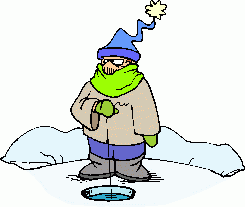The answer, finally:
So, we have a chi-square value that we calculated, called chi-square-calc (0.166) and a chi-square value that we looked up, called chi-square-crit (3.84). Comparing these two values, we find that our chi-square-calc is much smaller than the chi-square-crit (0.166 < 3.84), which means the deviations were small and the model fits the data. This supports Dilbert's hypothesis that sick days were random. So employees are probably really sick and not out fishing on those Mondays and Fridays. |
I'm from Minnesota, where real men go ice-fishing and real women laugh at them. |
Copyright University of Maryland, 2007
You may link to this site for educational purposes.
Please do not copy without permission
requests/questions/feedback email: mathbench@umd.edu
